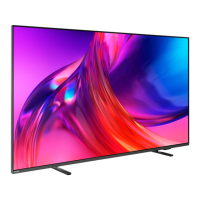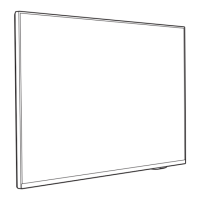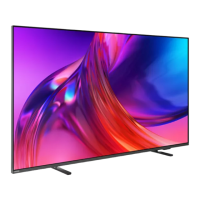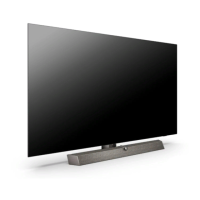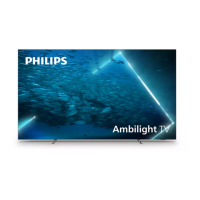Do you have a question about the Philips The One 8558 Series and is the answer not in the manual?
Provides an overview of the Philips Google TV Home screen features and navigation.
Explains the Dashboard panel for accessing settings, device controls, and notifications.
Details the differences between Google TV and Basic modes for TV operation.
Guides on how to open and navigate the TV's Home screen interface.
Emphasizes reading safety instructions before using the TV for safe operation.
Provides instructions for installing the TV stand or preparing for wall mounting.
Offers advice on optimal TV placement for viewing and Ambilight effect.
Details how to connect the TV's power cable securely and safely.
Explains how to connect the antenna cable for TV signal reception.
Guides on connecting the satellite F-type connector to the TV.
Identifies the functions of each key on the TV remote control.
Instructions for pairing the remote control with the TV using Bluetooth.
Explains how to use voice commands for searching content on the TV.
Notes the location and function of the TV's infrared sensor for remote control.
Covers replacing remote control batteries and cleaning instructions.
Details how to switch the TV on, put it in standby, and reboot it.
Explains how to perform basic TV operations using the TV's joystick key.
Guides through the process of installing satellite channels and configuring settings.
Covers installing antenna channels, automatic updates, and manual updates.
Explains how to copy and upload channel lists between TVs for setup.
Describes reception types for terrestrial and cable broadcast standards.
Details settings for installing DVB-C channels, including operator-specific values.
Explains how to resolve conflicts when multiple channels share the same number.
Covers selecting automatic or manual modes for network frequency scanning.
General instructions for installing TV channels.
Information on how channels are organized and displayed after installation.
How to filter and sort channels by type or availability.
Guides on tuning to channels, switching, and using previous channel functionality.
Allows adjusting subtitle language, audio language, and other channel-specific settings.
Features for users with hearing or visual impairments, including audio descriptions.
Explains how to create, manage, and use favorite channel lists for quick access.
Instructions for accessing and navigating Teletext pages.
Information on using interactive TV services and HbbTV features.
Explains the TV Guide feature and its data sources for program listings.
Guides on opening, navigating, and tuning to programs via the TV Guide.
General guidance on connecting external devices for optimal picture and sound quality.
Settings for optimizing HDMI connections for Ultra HD signals and compatibility.
Instructions for connecting Home Theatre Systems via HDMI ARC/eARC for enhanced audio.
Details using the optical audio connection for sound output to audio systems.
Explains how to insert and use a CAM module with a smart card for premium channels.
How to connect smartphones or tablets using the Philips TV Remote App.
Guidance on connecting a Blu-ray disc player via HDMI for playback.
Instructions for connecting and adjusting volume for headphones.
How to connect game consoles via HDMI for optimal gaming experience.
Instructions for connecting a USB keyboard for text input on the TV.
How to view media files (photos, music, videos) from USB storage devices.
Connecting digital cameras to view photos directly on the TV.
Connecting camcorders via HDMI for video playback on the TV.
Connecting a computer to use the TV as a PC monitor via HDMI.
Guides on connecting the TV to a home network for internet access via Wi-Fi or wired connection.
Explains how to sign in with a Google Account for full TV capabilities and app access.
Instructions on how to launch and use the TV's web browser.
Guides on switching between connected devices and TV tuners using the Sources menu.
Provides quick access to TV functions and settings menus for efficient operation.
Covers various picture settings, styles, and adjustments for optimal visual quality.
Explains picture format adjustments and ultra motion clarity settings for screen display.
Details sound styles, personal settings, and equalization options for audio customization.
Options for managing TV sound output, including speakers and digital audio formats.
Instructions for controlling Ambilight effects, styles, and modes for ambient lighting.
Explains how to find, install, and manage applications from the Google Play Store.
Details how to rent movies, buy TV shows, and play games via the Google Play Store.
Guides on launching and closing applications on the TV.
Instructions on stopping, clearing cache, and uninstalling apps for performance optimization.
Features for users with disabilities, including high contrast text and text-to-speech.
Information about the TV's system software, updates, and basic system information.
Settings for configuring the TV's date, time, and time zone.
Allows changing the language of the TV menu and messages.
Configuration for connected USB keyboards, including layout settings.
Information on internal TV storage usage for apps and media files.
Settings for the screen saver, including photo sources and display information.
Options for managing TV power behavior and energy saving features.
How to cast content from mobile devices to the TV using Google Cast.
Enables or disables system sounds for TV operations.
Features for setting parental controls, locking channels, and managing PIN codes.
Configuration options for retail or shop display modes.
Instructions on how to restart the TV to improve performance or resolve issues.
Guides on pairing, connecting, and managing Bluetooth devices with the TV.
Covers remote control pairing, information, software updates, and device operations.
How to view media files from a computer or NAS over a home network.
Managing favorite folders or files from USB devices for quick access.
Accessing most popular or last played media files from USB storage.
Viewing media files directly from connected USB flash drives or hard drives.
Steps for opening video folders and playing video files from USB.
Guides on opening photo folders, viewing photos, and managing slideshows from USB.
Instructions for opening music folders and playing audio files from USB.
Details on downloading and using the Philips TV Remote App for smartphone control.
Requirements for playing games on the TV, including internet connection and Google Account.
Information on connecting wireless gamepads for gaming on the TV.
Steps to connect and play games from external consoles or computers via HDMI.
Features and settings within the gaming control bar for an enhanced gaming experience.
Information on accessing and using the Netflix app on the TV, including spatial audio settings.
Overview of Alexa voice control capabilities and requirements for TV operation.
Step-by-step guide to set up and use Alexa voice commands with the TV.
Information on the TV's energy efficiency, disposal, and environmental compliance.
Technical specifications related to the TV's power requirements and consumption.
Details about the TV's operating system version and platform.
Technical specifications for TV signal reception, including tuner bands and supported standards.
Information on the TV's screen size and diagonal measurements.
Supported computer and video input resolutions and refresh rates.
Lists all available input and output ports and connectivity options on the TV.
Technical specifications for the TV's audio output power and sound features.
Details supported multimedia connections, file systems, and playback formats.
Instructions on registering the TV for support and benefits.
How to access the TV's built-in help system and download the user manual.
Tools for diagnosing TV issues, checking settings, and performing self-checks.
Common problems and solutions related to TV startup, remote control, picture, sound, and network issues.
Information on accessing Philips TV's online support resources and FAQs.
Contact information for customer support and details on product repair procedures.
Essential safety instructions regarding electric shock, fire, injury, and battery hazards.
Guidelines for cleaning and maintaining the TV screen to prevent damage.
Legal terms and conditions governing the use of the TV product.
Terms of use, privacy policy, and privacy settings for the Smart TV functionality.
Trademark information for Google TV and related Google services.
Trademark information for HDMI interface and logos.
Information on HEVC patents and advanced decoding capabilities.
Information on AMD FreeSync Premium technology for gaming.
Trademark and licensing information for Dolby Vision and Dolby Atmos technologies.
Trademark and licensing information for DTS:X audio technology.
Trademark and licensing information for DTS Play-Fi wireless audio technology.
Trademark information for the Wi-Fi CERTIFIED logo.
Trademark information for Kensington security products.
Acknowledges other registered and unregistered trademarks.
